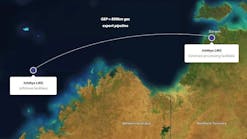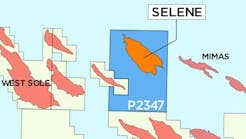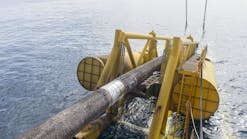Jeremy Beckman - London
Independents rewarded in 25th round
Interest in the UK sector remains high, with 100 companies gaining licenses across 257 blocks from Britain’s 25th offshore round.
The total of 171 licenses, up from 150 under the 24th round, comprises 124 traditional, six “frontier”, and 41 “promote” awards. The Department of Energy and Climate Change is also considering applications for a further 46 blocks where activity might impact protected natural conservation areas. Awards in these cases will be subject to stricter environmental impact assessments.
Independents have largely driven emergence of new exploration plays on the UKCS in recent years. Among the more successful in the latest round, Dana Petroleum won three blocks close to its West and East Rinnes oil finds in the northern North Sea, and two licenses in the Greater Kittiwake oil-producing area in the central sector.
Canada’s Sterling Resources picked up two blocks in the southern gas basin, 20 km (12.5 mi) from the Breagh gas discovery, currently undergoing further appraisal drilling. In the same sector, Serica Energy won a license immediately west of its Chablis field, also under appraisal, while heavy oil specialist Nautical Petroleum gained six traditional licenses, four as operator, in the far north.
Paul Dymond, Oil & Gas UK’s operations director, welcomed the awards, but cautioned that the recent oil price fall might impact resultant activity. He urged the government to provide incentives to sustain production. Oil and Gas UK has lobbied the government for measures to stimulate investment in areas west of Shetland, high pressure/high temperature fields, and schemes to raise recovery from existing UK fields above the current average of 45%.
Speaking at the recent Subsea Europe conference in London, chief executive Malcolm Webb said: “That even when oil prices were high, these projects were failing to gain sanction. Without them, and if production continues to fall, pipelines built for the bigger fields will have to be removed. So the [nearby] small fields, unless brought on stream in the near future, will never come on stream.”
Webb suggested a better fiscal regime in the UKCS would allow in more new players and free up offshore asset transfers. “We also need government help to unfreeze credit so new projects can go forward, and to improve access to oil and gas infrastructure. One of the many lessons of the credit crunch is that doing nothing can make matters worse.”
Multi-well abandonment runs to plan
Subsea contractor TS Marine has completed a series of well abandonments for BP, Perenco, and Tullow Oil in the UK southern and central North Sea. The company chartered theIsland Contractor vessel for preliminary work on the wells, including debris cap removal, wellbore drifting, plugging of circulation vent holes, and removal of marine growth and fishing net debris.
A recovered wellhead onboard theIsland Constructor.
TS Marine employed Norse Cutting and Abandonment’s (NCA) abrasive water jet cutting equipment to cut casing and recover the wellheads, obviating the need to use explosives. After installing the recovery rigging, the NCA tools were deployed in the well, and the cut was completed. Each wellhead was recovered in a single operation.
Norway spending holding steady
Norway has closed applications for its 20th licensing round, which opened in late June, having received bids from 46 qualified companies. Conditions relating to environmental concerns and fishing interests have been tightened, with some blocks subject to time limitations on seismic surveys. Awards should be announced in spring 2009.
The number of bidders is nearly double the total that applied for production licenses under the previous round. And investment across the Norwegian shelf remains buoyant, according to a report by the oil industry association OLF. They predict that spending this year will reach a record NOK 126 billion ($17.86 billion), and could climb to NOK 136 billion ($19.25 billion) per year, despite the global economic downturn.
Looking further ahead, the picture is more uncertain. Assuming the current crisis is resolved, and oil prices remain above $70/bbl, investment will likely tail off to NOK 115 billion ($16.3 billion) in 2012. But if low oil prices persist, capital spending on the NCS could fall sharply.
The industry’s biggest challenge is how to deal with a rapid decline in NCS production, according to OLF economics manager, Bjorn Harald Martinsen. Norway’s last confirmed large discovery was Ormen Lange in 1997, and the current portfolio of new finds will not sustain a high level of spending in the run-up to predicted peak output in 2015. In the industry’s view, he added, any remaining giant fields are most likely in the northern areas currently off limits to petroleum activity.
Harald to host Trym development
Danish company Dong Energy has submitted a development proposal for the Trym gas-condensate field in the southern Norwegian sector. Dong plans two subsea horizontal wells tied back to the DUC-operated Harald platform in Danish waters via a 6-km (3.7-mi) pipeline.
The project, expected to be approved by the Norwegian authorities in January, will be the first trans-median line development between the two countries to be hosted from Danish facilities. Norske Shell, Trym’s previous operator, put forward a similar scheme in 2006, but this was vetoed by Norway’s government because of high third-party tariffs.
According to London-based field analysts Scanboss, the capital expenditure of Dong’s plan is more than twice Shell’s proposed investment, at DKr 2.4 billion ($407 million). This may be partly down to the fact that Shell intended to drill a single, but riskier, subsea trilateral well.
Following processing on Harald, Trym’s gas will be sent by pipeline to the Tyra platform, landing thereafter in Nybro, Denmark, or Den Helder in the Netherlands. Oil/condensate will move through another pipeline to the Gorm field and onwards to Fredericia in Denmark. Production should start towards end-2010.
Wintershall bids for Revus
German company Wintershall has made a €581 million ($733 million) bid to acquire Norwegian independent Revus Energy. Stavanger-based Revus has interests in 60 offshore licenses in Norway and the UK. Revus’ board supports the offer and has recommended acceptance to the company’s shareholders.
In the UK southern sector, ATP has agreed a $430 million sale of majority working interests in its Tors and Wenlock gas field developments to French energy company EDF International. ATP UK will continue as operator of both projects, although EDF has a later option to purchase the remaining interests. ATP plans to use the proceeds to reduce its debt and to fund developments elsewhere.






